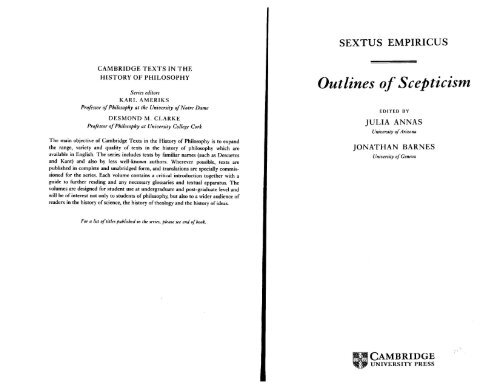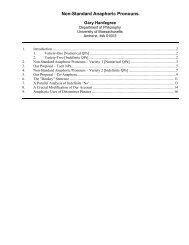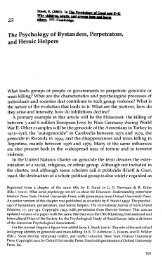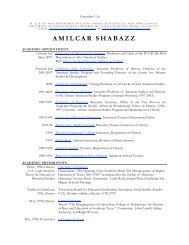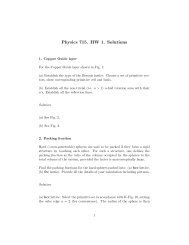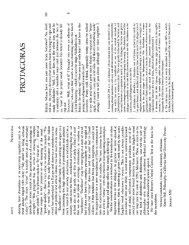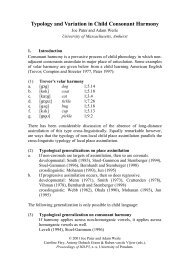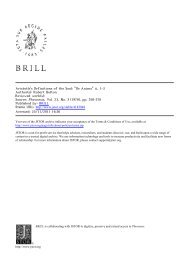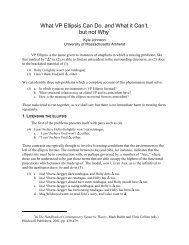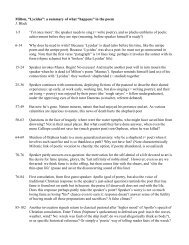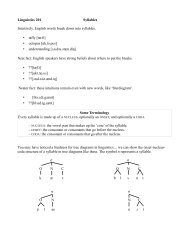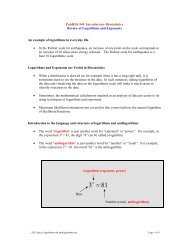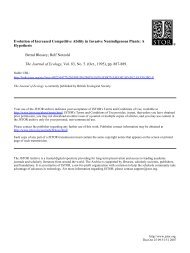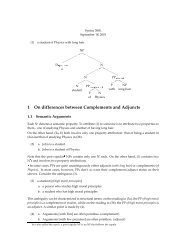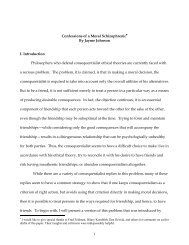HISTORY OF PHILOSOPHY Outlines of Scepticism
HISTORY OF PHILOSOPHY Outlines of Scepticism
HISTORY OF PHILOSOPHY Outlines of Scepticism
You also want an ePaper? Increase the reach of your titles
YUMPU automatically turns print PDFs into web optimized ePapers that Google loves.
<strong>HISTORY</strong> <strong>OF</strong> <strong>PHILOSOPHY</strong><br />
CAMBRIDGE TEXTS IN THE<br />
Series editors<br />
KARL AMERIKS<br />
SEXTUS EMPIRICUS<br />
<strong>Outlines</strong> <strong>of</strong> <strong>Scepticism</strong><br />
Pr<strong>of</strong>rssor <strong>of</strong>Philosophy at the University <strong>of</strong>Notre Dame EDITED BY<br />
DESMOND M. CLARKE JULIA ANNAS<br />
Pr<strong>of</strong>essor <strong>of</strong>Philosophy at University College Cork<br />
The main objective <strong>of</strong> Cambridge Texts in the History <strong>of</strong> Philosophy is to expand<br />
the range, variety and quality <strong>of</strong> texts in the history <strong>of</strong> philosophy which are<br />
available in English. The series includes texts by familiar names (such as Descartes<br />
and Kant) and also by less well-known authors. Wherever possible, texts are<br />
published in complete and unabridged form, and translations are specially commis<br />
sioned for the series. Each volume contains a critical introduction together with a<br />
guide to further reading and any necessary glossaries and textual apparatus. The<br />
volumes are designed for student use at undergraduate and post—graduate level and<br />
will be <strong>of</strong> interest not only to students <strong>of</strong> philosophy, but also to a wider audience <strong>of</strong><br />
readers in the history <strong>of</strong> science, the history <strong>of</strong> theology and the history <strong>of</strong> ideas.<br />
For a list <strong>of</strong>lit les published in the series, please see end <strong>of</strong>book.<br />
University ufArizonu<br />
JONATHAN BARNE<br />
University <strong>of</strong> Geneva<br />
, CAMBRIDGE<br />
UNIVERSITY PRESS
<strong>Outlines</strong> <strong>of</strong> <strong>Scepticism</strong><br />
BOOK I
<strong>Outlines</strong> <strong>of</strong> <strong>Scepticism</strong><br />
These are the ContentS <strong>of</strong> the First Book <strong>of</strong> the <strong>Outlines</strong> <strong>of</strong><strong>Scepticism</strong>:<br />
ii<br />
iii<br />
iv<br />
V<br />
vi<br />
vii<br />
vu’<br />
ix<br />
x<br />
x<br />
Xli<br />
xiii<br />
xiv<br />
xv<br />
xvi<br />
xvii<br />
Xviii<br />
XIX<br />
xx<br />
xxi<br />
Xxii<br />
xxiii<br />
xxiv<br />
xxv<br />
xxvi<br />
xxvii<br />
xxviii<br />
Xxix<br />
xxx<br />
caci<br />
Xxxii<br />
jcomi<br />
xxxiv<br />
The most fundamental difference among philosophies<br />
The accounts constitutive <strong>of</strong> <strong>Scepticism</strong><br />
Its nomenclature<br />
What is the concept <strong>of</strong> <strong>Scepticism</strong>?<br />
The Sceptic<br />
Its principles<br />
Do Sceptics hold beliefs?<br />
Do they belong to a school?<br />
Do they study natural science?<br />
Do they reject what is apparent?<br />
The standard <strong>of</strong> <strong>Scepticism</strong><br />
Its m<br />
The general modes <strong>of</strong> <strong>Scepticism</strong><br />
The Ten Modes<br />
The Five Modes<br />
The Two Modes<br />
What are the modes which overthrow those who <strong>of</strong>fer causal<br />
explanations?<br />
The Sceptical phrases<br />
The phrase ‘No more’<br />
Non-assertion<br />
‘Perhaps’, ‘Maybe’ and ‘Possibly’<br />
‘I suspend judgement’<br />
‘I determine nothing’<br />
‘Everything is undetermined’<br />
‘Everything is inapprehensible’<br />
‘I have no apprehension’ and ‘I do not apprehend’<br />
‘Opposed to every account there is an equal account’<br />
Rules for the Sceptical Phrases<br />
Is <strong>Scepticism</strong> a path to the philosophy <strong>of</strong> Heraditus?<br />
Does the school <strong>of</strong> Democritus differ from <strong>Scepticism</strong>?<br />
Does Cyrenaicism differ from <strong>Scepticism</strong>?<br />
Does Protagoreanism differ from <strong>Scepticism</strong>?<br />
Does <strong>Scepticism</strong> differ from the Academies?<br />
Is Medical Empiricism the same as <strong>Scepticism</strong>?<br />
Book I<br />
i The most fundamental difference among philosophies<br />
[i] When people are investigating any subject, the likely result is<br />
either a discovery, or a denial <strong>of</strong> discovery and a confession <strong>of</strong><br />
inapprehensibility, or else a continuation <strong>of</strong> the investigation. [2]<br />
This, no doubt, is why in the case <strong>of</strong>philosophical investigations, too,<br />
some have said that they have discovered the truth, some have<br />
asserted that it cannot be apprehended, and others are still investi<br />
gating.<br />
[31 Those who are called Dogmatists in the proper sense <strong>of</strong> the<br />
word think that they have discovered the truth — for example, the<br />
schools <strong>of</strong> Aristotle and Epicurus and the Stoics, and some others.<br />
The schools <strong>of</strong> Clitomachus and Carneades, and other Academics,<br />
have asserted that things cannot be apprehended.’ And the Sceptics<br />
are still investigating. [] Hence the most fundamental kinds <strong>of</strong><br />
philosophy are reasonably thought to be three: the Dogmatic, the<br />
Academic, and the Sceptical. The former two it will be appropriate<br />
for others to describe: in the present work we shall discuss in outline 2<br />
the Sceptical persuasion. By way <strong>of</strong> preface let us say that on none <strong>of</strong><br />
the matters to be discussed do we affirm that things certainly are just<br />
as we say they are: rather, we report 3 descriptively on each item<br />
according to how it appears to us at the time. 4<br />
ii The accounts constitutive <strong>of</strong> <strong>Scepticism</strong><br />
[sJ The Sceptical philosophy contains both a general and a specific<br />
account. 5 In the general account we set out the distinctive character <strong>of</strong><br />
<strong>Scepticism</strong>, saying what the concept <strong>of</strong>it is, what are its principles and<br />
The same is said <strong>of</strong>the Cyrenaics at i 215. For the New Academy see I 220—31; and<br />
note that other sources expressly say that the Academics did not ‘assert that<br />
things cannot be apprehended’.<br />
2 utot1ntwtLKGç: the work is an outline or cotitwaç, and Sextus frequently<br />
reminds us <strong>of</strong> the fact: i 206, 222, 239; III, 79, i8s, 194-; III I, 114, 167, 279. Note<br />
also his assurances that he is only <strong>of</strong>fering ‘few out <strong>of</strong>many’ examples (158, note)<br />
and that he is concerned to be brief(i 163, note); and see i 94.; 1184,212; III 56, 71,<br />
135, 168.<br />
For this use <strong>of</strong> the term ‘report’ see I 15, 197, 203.<br />
Cf. e.g. 1 191; H i8.<br />
Cf.Mviii.
<strong>Outlines</strong> <strong>of</strong> <strong>Scepticism</strong><br />
what its arguments what is its standard and what its aim, what are the<br />
modes <strong>of</strong> suspenSiOn <strong>of</strong> judgement, how we understand sceptical<br />
assertions, and what distinguishes <strong>Scepticism</strong> from neighbouring<br />
philosophies.<br />
against each <strong>of</strong> the parts <strong>of</strong> what they call philosophy.<br />
Let us first deal with the general account, beginning our sketch<br />
with the names given to the Sceptical persuasion.<br />
6 [6] The specific account is the one in which we argue<br />
iii The nomenclature <strong>of</strong> <strong>Scepticism</strong><br />
[7]7 The Sceptical persuasion, then, is also called Investigative, from<br />
8 Suspensive, from the<br />
its activity in investigating and inquiring;<br />
feeling that comes about in the inquirer after the investigation;<br />
Aporetic, either (as some say) from the fact that it puzzles over<br />
investigates everything, or else from its being at a loss whether to<br />
assent or deny; and Pyrrhonian, from the fact that Pyrrho appears to<br />
us to have attached himself to <strong>Scepticism</strong> more systematically and<br />
conspicuously than anyone before him.’°<br />
iv What is <strong>Scepticism</strong>?<br />
9 and<br />
[8] <strong>Scepticism</strong> is an ability to set out oppositions among things which<br />
appear and are thought <strong>of</strong> in any way at all,” an ability by which,<br />
because <strong>of</strong> the equipollence in the opposed objects and accounts, we<br />
come first to suspension <strong>of</strong> judgement and afterwards to tranquillity.<br />
[9] We call it an ability not in any fancy sense, but simply in the<br />
sense <strong>of</strong> ‘to be able to’. Things which appear we take in the present<br />
context to be objects <strong>of</strong> perception, which is why we contrast them<br />
with objects <strong>of</strong> thought. ‘In any way at all’ can be taken either with ‘an<br />
ability’ (to show that we are to understand the word ‘ability’ in its<br />
straightforward sense, as we said), or else with ‘to set out oppositions<br />
6 The programme (with which compare the resumé at t 209) corresponds well to<br />
the contents <strong>of</strong>PHI — except that x 13—20 do not appear to be covered.<br />
With i 7 cf. Diogenes Laertius ix 69—70.<br />
8 The verb translated ‘inquire’ is mthtteoOat, cognate with oxextucOç<br />
(‘sceptical’).<br />
‘Puzzle over’ renders ãitopth, from which ‘aporetic’ derives.<br />
10 On this explanation <strong>of</strong> the name ‘Pyrrhonism’ see BARNES [1992], pp. 4284—6.<br />
“ See Diogenes Laertius IX 78 (reporting Aenesidemus).<br />
Book I<br />
among the things which appear and are thought <strong>of</strong>’: we say ‘in any<br />
way at all’ because we set up oppositions in a variety <strong>of</strong> ways —<br />
opposing what appears to what appears, what is thought <strong>of</strong> to what is<br />
thought <strong>of</strong>, and crosswise, so as to include all the oppositions.’<br />
else we take the phrase witha ‘the things which appear and are thought<br />
<strong>of</strong>’, to show that we are not to investigate how what appears appears<br />
or how what is thought <strong>of</strong> is thought <strong>of</strong>, but are simply to take them<br />
for granted.’<br />
[ioj By ‘opposed accounts’ we do not necessarily have in mind<br />
affirmation and negation, but take the phrase simply in the sense <strong>of</strong><br />
‘conflicting accounts’.’<br />
regard to being convincing or unconvincing: none <strong>of</strong> the conflicting<br />
accounts takes precedence over any other as being more convincing.’<br />
Suspension <strong>of</strong> judgement is a standstill <strong>of</strong> the intellect, owing to<br />
which we neither reject nor posit anything.’<br />
freedom from disturbance or calmness <strong>of</strong>soul. We shall suggest in the<br />
chapter on the aim <strong>of</strong> scepticism how tranquillity accompanies<br />
suspension <strong>of</strong> judgement.’<br />
3<br />
2 Or<br />
4 By ‘equipollence’ we mean equality with<br />
8<br />
v The Sceptic<br />
5<br />
7 is<br />
6 Tranquillity’<br />
[uj The Pyrrhonian philosopher has been implicitly defined in our<br />
account <strong>of</strong> the concept <strong>of</strong> the Sceptical persuasion: a Pyrrhonian is<br />
someone who possesses this ability.<br />
vi The principles <strong>of</strong> <strong>Scepticism</strong><br />
[xa] The causal principle <strong>of</strong> scepticism we say is the hope <strong>of</strong> becoming<br />
tranquil)<br />
9 Men <strong>of</strong> talent, troubled by the anomaly in things and<br />
Reading in place <strong>of</strong> KaO’ otovôqxotE tpóxov, as Mau suggests. The<br />
sense is not in doubt, and Mau’s emendation makes it clear.<br />
12 See I 31—2; M viii 46.<br />
‘ Cf. 119.<br />
14<br />
Cf. I, 190, 198, 202.<br />
See 1190; cf. 196, 198, 202.<br />
16 See I 196 (and cf. I 192, Ofl non-assertion); and note csp. couissiN [1929].<br />
17 àtapaa: ‘untroubledness’ — the word is formed from an alpha privative and<br />
tapdttrtv, ‘to trouble’.<br />
18<br />
25—32 (cf. 232).<br />
19 Cf. i 26; see STRIKER [199oa]; ANNAS [1993aj, ch. 8.
Uutftnes 01 .3CCptiLlSlll<br />
puzzled as to which <strong>of</strong> them they should rather assent to, came to<br />
investigate what in things is true and what false, thinking that by<br />
deciding these issues they would become tranquil.<br />
The chief constitutive principle <strong>of</strong> scepticism is the claim that to<br />
every account an equal account is opposed;<br />
think, that we come to hold no beliefs.<br />
vii Do Sceptics hold beliefs?<br />
2° for it is from this, we<br />
2’<br />
[13] When we say that Sceptics do not hold beliefs, we do not take<br />
‘belief’ in the sense in which some say, quite generally, that belief is<br />
acquiescing in something; for Sceptics assent to the feelings forced<br />
upon them by appearances for example, they would not say, when<br />
heated or chilled, ‘I think I am not heated (or: chilled)’. Rather, we<br />
say that they do not hold beliefs in the sense in which some say that<br />
belief is assent to some unclear object <strong>of</strong> investigation in the<br />
sciences;<br />
[14] Not even in uttering the Sceptical phrases about unclear<br />
matters — for example, ‘In no way more’, or ‘I determine nothing’, or<br />
one <strong>of</strong> the other phrases which we shall later discuss do they hold<br />
beliefs. For if you hold beliefs, then you posit as real the things you<br />
are said to hold beliefs about; but Sceptics posit these phrases not as<br />
necessarily being real. For they suppose that, just as the phrase<br />
‘Everything is false’ says that it too, along with everything else, is false<br />
(and similarly for ‘Nothing is true’), so also ‘In no way more’ says that<br />
it too, along with everything else, is no more so than not so, and<br />
hence it cancels itself along with everything else. And we say the same<br />
<strong>of</strong> the other Sceptical phrases. [ii] Thus, if people who hold beliefs<br />
posit as real the things they hold beliefs about, while Sceptics utter<br />
their own phrases in such a way that they are implicitly cancelled by<br />
22 —<br />
23 for Pyrrhonists do not assent to anything unclear.<br />
24 —<br />
20 See i 202—5 (cf. i 18).<br />
21 The Dogmatists alleged that the Sceprics did in fact hold beliefs: see eg.<br />
Aristodes, apud Eusebius, PE xxv xviii 9—12; Diogenes Laertius LX ioa—i. (cf. ix<br />
68). — On the controversy surrounding the issues raised by this chapter see<br />
FREDE [‘979]; BURNYEAT [1980a], [1984]; BARNES [ig88j, [1990a], pp. 2617—49.<br />
22 Cf. I 29, 193, 229—30; 1110.<br />
23 Cf. 116, 193, 197.<br />
24 See 1187—208.<br />
themselves, then they cannot be said to hold beliefs in uttering<br />
them. 25<br />
But the main point is this: in uttering these phrases they say what is<br />
apparent to themselves and report their own feelings without holding<br />
opinions, affirming nothing about external objects.<br />
26<br />
27<br />
viii Do Sceptics belong to a school?<br />
[io] We take the same attitude to the question: Do Sceptics belong to<br />
a school? If you say that a school involves adherence to a number <strong>of</strong><br />
beliefs which cohere both with one another and with what is<br />
apparent,<br />
then we shall say that Sceptics do not belong to any school. [iv] But if<br />
you count as a school a persuasion which, to all appearances, coheres<br />
with some account, the account showing how it is possible to liveb<br />
correctly (where ‘correctly’ is taken not only with reference to virtue,<br />
but more loosely, and extends to the ability to suspend judgement’) —<br />
in that case we say that Sceptics do belong to a school. For we<br />
coherently follow, to all appearances, an account which shows us a life<br />
in conformity with traditional customs and the law and persuasions<br />
and our own feelings.<br />
28 and if you say that belief is assent to something unclear,<br />
ix Do Sceptics study natural science?<br />
[i8] We say something similar again when investigating the question<br />
<strong>of</strong> whether Sceptics should study natural science. We do not study<br />
b Deleting ôOKEiv, as Mutschmann suggested.<br />
We close the parenthesis after &atEvovtoç rather than after á4eéatepov:<br />
the clause icai ... &atevovtoc is part <strong>of</strong> the gloss on ôpOJG and not<br />
explanatory <strong>of</strong> xoi Aóyov.<br />
25 Cf. i 206.<br />
26 Cf. i 208.<br />
27 Some denied that Pyrrhonism constituted a school <strong>of</strong>philosophy: see Diogenes<br />
Laertius I 20; cf. Aristocles, apud Eusebius, PE xiv xviii o; Clement, strom VIII<br />
iv z6.z. On the concept <strong>of</strong> a school see GLUCKER [i8].<br />
28 ‘Cohere with’ etc., here and in the section, translate àKOovOth and its cognate<br />
noun. The verb literally means ‘follow’, and so we normally translate it (we also<br />
use ‘follow’ for the compounds icataicokoiiOth and tapaKo)ouOeiv and for<br />
rraOat); but, for the noun, ‘implication’ and ‘validity’ have sometimes been<br />
preferred, and the adjective àicóouOog comes out as ‘apposite’.<br />
6 7
<strong>Outlines</strong> <strong>of</strong> <strong>Scepticism</strong><br />
natural science in order to make assertions with firm conviction about<br />
any <strong>of</strong> the matters on which scientific beliefs are held. But we do<br />
touch on natural science in order to be able to oppose to every<br />
account an equal account, 29 and for the sake <strong>of</strong> tranquillity.<br />
also the spirit in which we approach the logical and ethical parts <strong>of</strong><br />
what they call philosophy.<br />
3’<br />
. This is<br />
30<br />
32<br />
x Do Scepncs reject what is apparent?<br />
[19] Those who say that the Sceptics reject what is apparent have not,<br />
I think, listened to what we say. 33 As we said before, 34 we do not<br />
overturn anything which leads us, without our willing it, to assent in<br />
accordance with a passive appearance — and these things are precisely<br />
what is apparent. When we investigate whether existing things are<br />
such as they appear, we grant that they appear, and what we<br />
investigate is not what is apparent but what is said about what is<br />
apparent — and this is different from investigating what is apparent<br />
itself: [zo] For example,” it appears to us that honey sweetens (we<br />
concede this inasmuch as we are sweetened in a perceptual way); but<br />
whether (as far as the argument goes<br />
something we investigate — and this is not what is apparent but<br />
something said about what is apparent. 36<br />
And if we do propound arguments directly against what is appar<br />
ent, it is not because we want to reject what is apparent that we set<br />
them out, but rather to display the rashness <strong>of</strong> the Dogmatists; for if<br />
reasoning is such a deceiver that it all but snatches even what is<br />
apparent from under our very eyes, surely we should keep watch on it<br />
in unclear matters, to avoid being led into rashness by following it?<br />
35) it is actually sweet is<br />
d Retaining the MSS text: Mutschmann—Mau follow Heintz in adding .<br />
29 See<br />
30 See I 10, 25—30.<br />
31 For the three parts <strong>of</strong> philosophy see ii 12—13.<br />
32 See Diogenes Laertius ix 103—4.<br />
For other complaints <strong>of</strong> misrepresentation see I zoo, zo8.<br />
Sec i i, 17<br />
as The same Greek phrase occurs frequently elsewhere, and its meaning is usually<br />
plain; but here its unport is obscure and different scholars have construed it in<br />
different ways: see BRUNSCHWIG [19901.<br />
36 Cf. ii 72 (and on honey see i lox).<br />
Book I<br />
37<br />
xi The standard <strong>of</strong> <strong>Scepticism</strong><br />
[21]38 That we attend to what is apparent is clear from what we say<br />
about the standard <strong>of</strong> the Sceptical persuasion. ‘Standard’ has two<br />
senses: there are standards adopted to provide conviction about the<br />
reality or unreality <strong>of</strong> something (we shall talk about tliese standards<br />
when we turn to attack them 39<br />
attending to which in everyday life we perform some actions and not<br />
others — and it is these standards which are our present subject.<br />
[22] We say, then, that the standard <strong>of</strong> the Sceptical persuasion is<br />
what is apparent,<br />
they depend on passive and unwilled feelings and are not objects <strong>of</strong><br />
investigation. (Hence no-one, presumably, will raise a controversy<br />
over whether an existing thing appears this way or that; rather, they<br />
investigate whether it is such as it appears.)<br />
[23]’ Thus, attending to what is apparent, we live in accordance<br />
with everyday observances, without holding opinions — for we arc not<br />
able to be utterly inactive. 42 These everyday observances seem to be<br />
fourfold, and to consist in guidance by nature, necessitation by<br />
feelings, handing down <strong>of</strong> laws and customs, and teaching <strong>of</strong> kinds <strong>of</strong><br />
expertise. [24.] By nature’s guidance we arc naturally capable <strong>of</strong><br />
perceiving and thinking. 43 By the necessitation <strong>of</strong> feelings, hunger<br />
conducts us to food and thirst to drink. By the handing down <strong>of</strong><br />
customs and laws, we accept, from an everyday point <strong>of</strong> view, that<br />
piety is good and impiety bad. 4- By teaching <strong>of</strong> kinds <strong>of</strong> expertise we<br />
are not inactive in those which we accept. 45<br />
And we say all this without holding any opinions.<br />
); and there are standards <strong>of</strong> action,<br />
4° implicitly meaning by this the appearances; for<br />
On the notion <strong>of</strong> a standard or KpLti)ptov see STRIKER [197+], [199ob]; HUBY<br />
and NEAL [1989].<br />
38 Cf.MvIIzg—31.<br />
See II 14—17.<br />
40 See Diogenes Laertius ix 106, reporting the view <strong>of</strong> Aenesidemus.<br />
‘ With 123—4 compare I 237—9 (cf. 1226,231; 11102, 24.6, 254-i 1112,119, 151, 235); see<br />
e.g. BARNES [199oa], pp. 2641—9; ANNAS [1993a], cli. 8.<br />
42 On the question, Can the Sceptic Live? see M xx I6z—166; Diogenes Laertius LX<br />
Iop-Io5; Aristocles, apud Eusebius, FE xiv xviii 25—6; SeC e.g. BURNYRAT<br />
[198oa]; BARNES [1988aJ, [199ob].<br />
See e.g. M VIII 203.<br />
Cf. IIxz;MIX49.<br />
For types <strong>of</strong> expertise allegedly acceptable to Sceptics seeM I 99; v 1—3. -
[25<br />
<strong>Outlines</strong> <strong>of</strong> <strong>Scepticism</strong> Book I<br />
xii What is the aim <strong>of</strong> <strong>Scepticism</strong>?<br />
]44S It will be apposite to consider next the aim <strong>of</strong> the Sceptical<br />
persuasion. Now an aim is that for the sake <strong>of</strong> which everything is<br />
done or considered, while it is not itself done or considered for the<br />
sake <strong>of</strong> anything else.<br />
48 Up to<br />
47 Or: an aim is the final object <strong>of</strong>desire.<br />
now we say the aim <strong>of</strong> the Sceptic is tranquillity in matters <strong>of</strong> opinion<br />
and moderation <strong>of</strong> feeling in matters forced upon us. [261 For<br />
Sceprics began to do philosophy in order to decide among appear<br />
ances and to apprehend which are true and which false, so as to<br />
49 but they came upon equipollent dispute, and<br />
become tranquil;<br />
being unable to decide this they suspended judgement. And when<br />
they suspended judgement, tranquillity in matters <strong>of</strong> opinion fol<br />
lowed fortuitously.<br />
[27]° For those who hold the opinion that things are good or bad<br />
by nature are perpetually troubled. When they lack what they believe<br />
to be good, they take themselves to be persecuted by natural evils and<br />
they pursue what (so they think) is good. And when they have<br />
acquired these things, they experience more troubles; for they are<br />
elated beyond reason and measure, and in fear <strong>of</strong> change they do<br />
anything so as not to lose what they believe to be good. [aS] But those<br />
who make no determination about what is good and bad by nature<br />
neither avoid nor pursue anything with intensity; and hence they are<br />
tranquil.<br />
5’ They<br />
A story told <strong>of</strong> the painter Apelles applies to the Sceptics.<br />
say that he was painting a horse and wanted to represent in his picture<br />
the lather on the horse’s mouth; but he was so unsuccessful that he<br />
gave up, took the sponge on which he had been wiping <strong>of</strong>f the<br />
colours from his brush, and flung it at the picture. And when it hit the<br />
With z—o cf. in 235—8, M xx 110—67; Timon, frag. 8i Lloyd-Jones and<br />
Parsons (see BURNYEAT [1980bj); Diogenes Laerrius IX 107—8. See esp. STRIKER<br />
[199oa]; ANNAS [1993a], chh. i, ri.<br />
A standard definition: e.g. Cicero,fin t xii.i.z (Epicureans); Anus ap. Stobaeus,<br />
ccl II 77.16—17 (Stoics), 131.2—4 (Peripaterics).<br />
48 Again, a standard definition; see e.g. Anus ap. Stobaeus, eel II 76.21—4. (Stoics),<br />
131.4. (Periparetics); Alexander, an mant 15o.zo—i, x6zj....<br />
See i iz.<br />
° Cf. iii 237—8; M xi 112—18, 145—6 (and below, i<br />
On this paragraph see ANNAS and BARNES [19851, pp. 167—171.<br />
picture, it produced a representation <strong>of</strong> the horse’s lather. [29] Now<br />
the Sceptics were hoping to acquire tranquillity by deciding the<br />
anomalies in what appears and is thought <strong>of</strong>, and being unable to do<br />
this they suspended judgement. But when they suspended judge<br />
ment, tranquillity followed as it were fortuitously, as a shadow<br />
52<br />
follows a body.<br />
We do nor, however, take Sceprics to be undisturbed in every<br />
way<br />
53 —<br />
we<br />
say that they are disturbed by things which are forced<br />
upon them; for we agree that at times they shiver and are thirsty and<br />
have other feelings <strong>of</strong> this kind.<br />
54 [30] But in these cases ordinary<br />
people are afflicted by two sets <strong>of</strong> circumstances: by the feelings<br />
themselves, and no less by believing that these circumstances are bad<br />
by nature. Sceptics, who shed the additional opinion that each <strong>of</strong><br />
these things is bad in its nature, come <strong>of</strong>f more moderately even in<br />
these cases.<br />
This, then, is why we say that the aim <strong>of</strong> Sceptics is tranquillity in<br />
matters <strong>of</strong> opinion and moderation <strong>of</strong> feeling in matters forced upon<br />
us. (Some eminent Sceptics have added as a further aim suspension <strong>of</strong><br />
55)<br />
judgement in investigations.<br />
xiii The general modes <strong>of</strong> suspension <strong>of</strong>judgement<br />
[33] Since we have been saying that tranquillity follows suspension <strong>of</strong><br />
judgement about everything, it will be apposite here to say how<br />
suspension <strong>of</strong> judgement comes about for us.<br />
It comes about —<br />
to<br />
put it rather generally —<br />
through<br />
the opposition<br />
<strong>of</strong> things. We oppose what appears to what appears, or what is<br />
thought <strong>of</strong> to what is thought <strong>of</strong>, or crosswise.<br />
56 [32] For example, we<br />
oppose what appears to what appears when we say: ‘The same tower<br />
appears round from a distance and square from nearby’.<br />
57 We oppose<br />
52 See Diogenes Laertius LX 107 (referring the image to Timon and Aenesidemus);<br />
below, 1205.<br />
Cf III 235—6; M xx ii—6o.<br />
See I 13.<br />
So Timon and Aenesidemus, according to Diogenes Laertius Ix io.<br />
See 1 8—9.<br />
A standard example: e.g. 1118; lIss; M vii zo8, 414; Lucretius IV 353—63; see<br />
ANNAS and BARNES [1985], pp. 104—6.
<strong>Outlines</strong> <strong>of</strong> <strong>Scepticism</strong><br />
what is thought <strong>of</strong> to what is thought <strong>of</strong> when, against those who<br />
seek to establish that there is Providence from the orderliness <strong>of</strong> the<br />
heavenly bodies, we oppose the view that <strong>of</strong>ten the good do badly<br />
while the bad do well and conclude from this that there is no<br />
58 [331 We oppose what is thought <strong>of</strong> to what appears, as<br />
Providence.<br />
Anaxagoras did when to the view that snow is white,c he opposed the<br />
thought that snow is frozen water and water is black and snow is<br />
59<br />
therefore black.<br />
In another sense we sometimes oppose present things to present<br />
things (as in the above examples) and sometimes present to past or<br />
future things. For example, when someone propounds to us an<br />
argument we cannot refute, [‘i-] we say to him: ‘Before the founder <strong>of</strong><br />
the school to which you adhere was born, the argument <strong>of</strong> the school,<br />
which is no doubt sound, was not yet apparent, although it was really<br />
there in nature. In the same way, it is possible that the argument<br />
opposing the one you have just propounded is really there in nature<br />
but is not yet apparent to us; so we should not yet assent to what is<br />
6°<br />
now thought to be a powerful argument’.<br />
6’<br />
xiv The Ten Modes<br />
[] So that we may get a more accurate impression <strong>of</strong> these oppo<br />
sitions, I shall set down the modes through which we conclude to<br />
suspension <strong>of</strong> judgement. But I make no affirmation either about<br />
their number or about their power — they<br />
may be more than those I shall describe.<br />
[36] The older sceptics<br />
may be unsound, and there<br />
62 normally <strong>of</strong>fer ten modes in number<br />
through which we are thought to conclude to suspension <strong>of</strong> judge-<br />
Like Mau, we reject Mutschmann’s insertion <strong>of</strong> ataoeuáovn.<br />
Cf. i iii.<br />
Cf. ii 244.<br />
60 With this compare the occasional appeal to merely possible examples: 1 89, 96,<br />
143 II 40; III 233—4.<br />
61 On this chapter see ANNAS and BARNEs [19851; and for the comparison between<br />
Sextus and Diogenes Laertius see BARNES [199z], pp. 4273—9 (with biblio<br />
graphy).<br />
62 They contrast with the more recent sceptics <strong>of</strong> i 16+; at M VU 34.5 Sexrus refers<br />
to Aenesidemus as author <strong>of</strong> the Ten Modes (but it is not clear how closely he is<br />
follewina Aenesidernus here in PH).<br />
Book I<br />
ment. (They use ‘arguments’ and ‘schemata’ as synonyms for ‘modes’.)<br />
They are:<br />
63 first, the mode depending on the variations among<br />
animals; second, that depending on the differences among humans;<br />
third, that depending on the differing constitutions <strong>of</strong> the sense-<br />
organs; fourth, that depending on circumstances; fifth, that depend<br />
ing on positions and intervals and places; sixth, that depending on<br />
admixtures; [37] seventh, that depending on the quantities and prepar<br />
ations <strong>of</strong> existing things; eighth, that deriving from relativity; ninth,<br />
that depending on frequent or rare encounters; tenth, that depending<br />
on persuasions and customs and laws and beliefin myths and dogmatic<br />
TM)<br />
suppositions. [38] (We use this order for the sake <strong>of</strong> argument.<br />
Superordinate to these are three modes: that deriving from the<br />
subject judging; that deriving from the object judged; that combined<br />
from both. For under the mode deriving from the subject judging are<br />
ranged the first four, since what judges is either an animal or a human<br />
or a sense, and is in some circumstance. The seventh and tenth are<br />
referred to the mode deriving from the object judged. The fifth, sixth,<br />
eighth and ninth are referred to the mode combined from both. [39]<br />
These three are in turn referred to the relativity mode. So we have as<br />
65<br />
most generic relativity, as specific the three, as subordinate the ten.<br />
So much by way <strong>of</strong> a plausible account <strong>of</strong> their number: now for<br />
their power.<br />
[4o] First, we said, is the argument according to which animals,<br />
depending on the differences among them, do not receive the same<br />
appearances from the same things. This we deduce both from the<br />
differences in the ways in which they are produced and from the<br />
67<br />
variation in the composition <strong>of</strong> their bodies.<br />
[41J In the case <strong>of</strong> the ways in which they are produced, this is<br />
because some animals are produced without copulation and some as a<br />
Reading icai with the MSS: Mutschmann—Mau emend to (‘or’).<br />
63 Cf. Diogenes Laertius XI 78—9; Philo, thr 169—70; Aristodes, apud Eusebius,<br />
PE, xiv xviii iz—iz.<br />
For alternative orderings <strong>of</strong> the modes see Diogenes Laertius ix 87: cf. ANNAS<br />
and BARNES [1985], pp. 26—30; BARNES [1992], pp. 4.278—9.<br />
65 Compare the taxonomy at I 136; cf. na.s and BARNES [1985], pp. 141—2.<br />
With i cf. Diogenes Laertius Ix 79—80; Philo, ebr 171—5; SCC ANNAS and<br />
BARNES [1985], pp. 39—53.<br />
67 On the structure <strong>of</strong> this argument see BARNES [1992], pp. 4.276—7.


